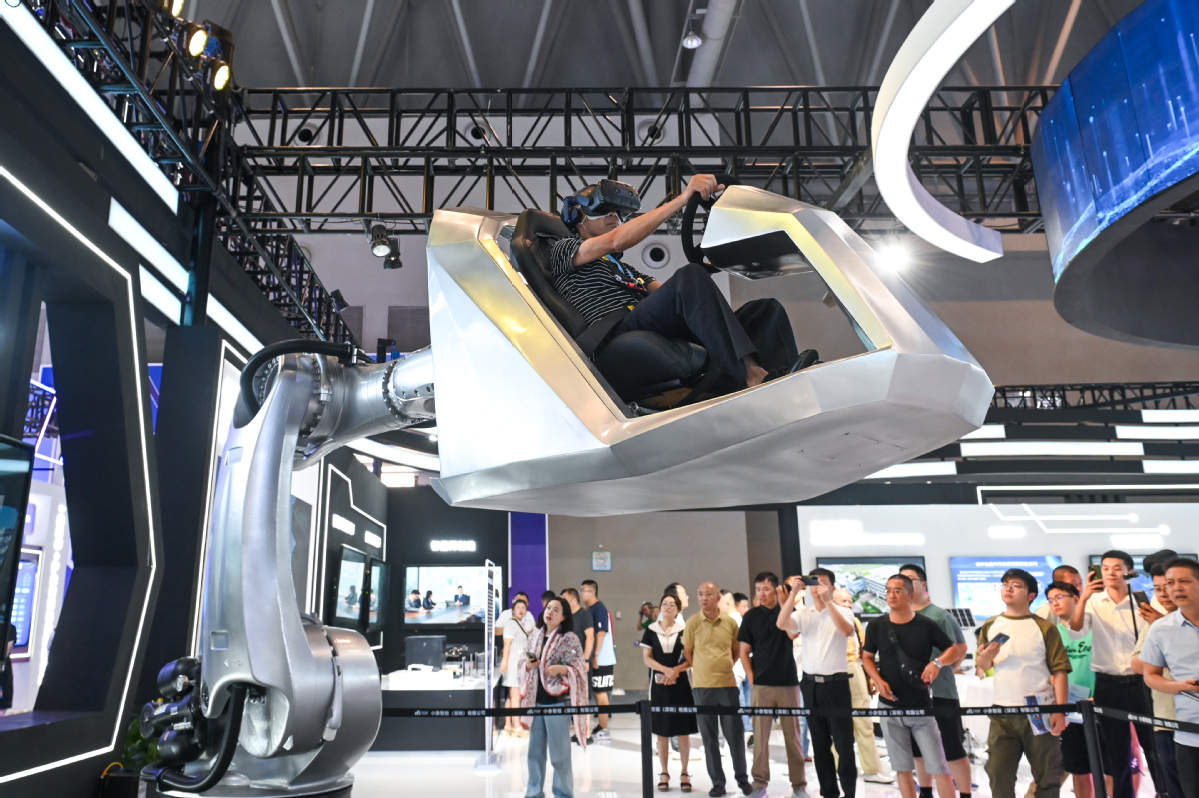
Cutting-edge technology like artificial intelligence is key to boosting the advantages of China's new energy vehicle industry, auto experts and executives noted at an industry forum in Beijing.
Ouyang Minggao, an academician of the Chinese Academy of Sciences, said that it is crucial to seize the opportunities presented by AI by promoting advanced driving-assist technology and advancing fully autonomous driving.
He made the remarks at the China EV100 Forum in Beijing earlier this month.
Ouyang, also a Tsinghua professor and vice-president of the China EV 100, said that the application of AI across the life cycle of NEV design, manufacturing, management and recycling is crucial to achieving better quality industry-wide, reduced costs and better efficiency.
China has led automotive electrification worldwide as the global penetration rate of new energy passenger vehicles is around 18 percent, while China's has surpassed 35 percent.
BYD founder and CEO Wang Chuanfu said at the forum that as Chinese carmakers are strengthening the research and development efforts in NEVs, the number of new vehicle launches is rapidly increasing.
Wang noted that NEVs accounted for more than 48.2 percent of car sales during the week from March 3-10. He estimated that the percentage of NEVs will exceed 50 percent within the next three months, becoming dominant in the market.
Wang said: "Only by laying a solid foundation in electrification can we construct the skyscraper of automotive intelligence."
As the world's largest NEV producer, BYD has reduced prices on several models since March, with some priced lower than gasoline-powered vehicles in the same segment.
An Conghui, chairman of Geely Auto Group, said intelligent connected NEVs represent a more advanced form of productivity, not just a replacement for traditional fuel vehicles.
"Electric vehicles may appear to have fewer components than traditional gasoline vehicles — they actually contain billions of lines of code and hold countless diverse demand scenarios waiting to be explored," he said.
An said Geely aspires to "become Volkswagen AG in the era of NEVs "because of its capabilities in global synergy.
Among Chinese carmakers, Geely ranks first in terms of globalization with a big number of brands, from its namesake Geely, Lynk & Co and Zeekr to Lotus, Polestar and Volvo.
EV startup Xpeng is considered the leading driving-assist solution provider nationwide. Its advanced driving-assist system XNGP had an 83 percent monthly active user rate as of February. It also excels in controlling costs for intelligent driving and aims to achieve a 50 percent cost reduction by the end of 2024 through technological innovation, according to CEO He Xiaopeng.
He said that the next decade will be about competition in intelligence. The turning point for advanced intelligent driving will arrive within the next 18 months.
He added that intelligent driving currently requires human intervention around 10 times per 100 kilometers on average, but this should drop to at least once in the future.
Xpeng's AI driving large model will be integrated into vehicles in the second quarter of this year, the first mass-produced implementation of its kind in the auto industry.
He also announced at the forum that Xpeng will launch a new brand with vehicles priced at 100,000 yuan ($13,890) to 150,000 yuan, which will feature the company's high-level intelligent driving-assist system, aimed at the younger generation.
Cars with similar prices might be developed into fully autonomous vehicles in the future, he said.
Xpeng's success with XNGP was contested by Huawei. Yu Chengdong, head of Huawei's smart vehicle unit, said at the forum: "Xpeng has shown excellence domestically in intelligent parking and driving, but we aim to innovate with our advanced intelligent driving system, and our cabin and driving experiences are acknowledged as top-notch."
Yu Chengdong added that due to supply chain issues and other factors, Huawei's intelligent driving system remains relatively costly, posing challenges for vehicles to be priced below 300,000 yuan.
Huawei's smart car business, which lost 6 billion yuan in 2023, is expected to turn a profit this year, thanks to strong sales of high-end models codeveloped with partners like Seres.
Horizon Robotics founder and CEO Yu Kai said that competitive next-generation autonomous driving systems should be evaluated on their pass rate in standard scenarios, efficiency of passage and humanlike behavior to ensure comfort and familiarity for people.
The chipmaker seized a 35.5 percent share in the driving-assist segment in 2023, second only to Nvidia.
There are more than 110 models that sport their chips, with the number continuing to increase. Its clients include BYD and Li Auto, Yu Kai said.

